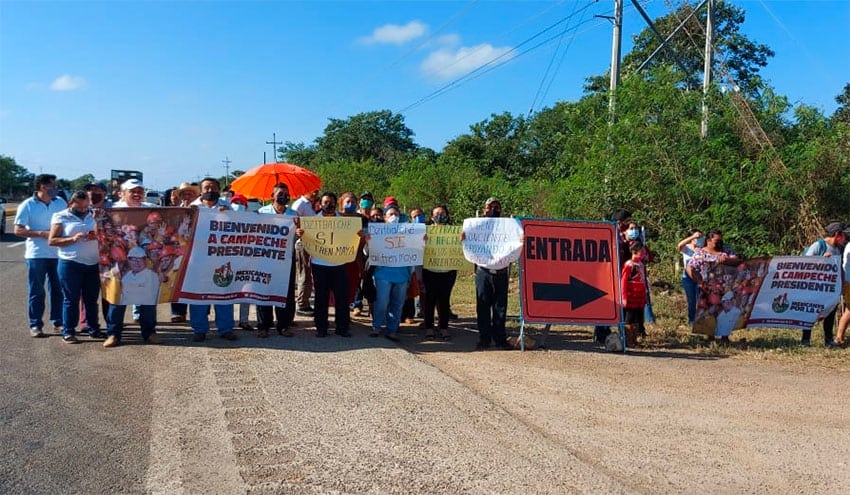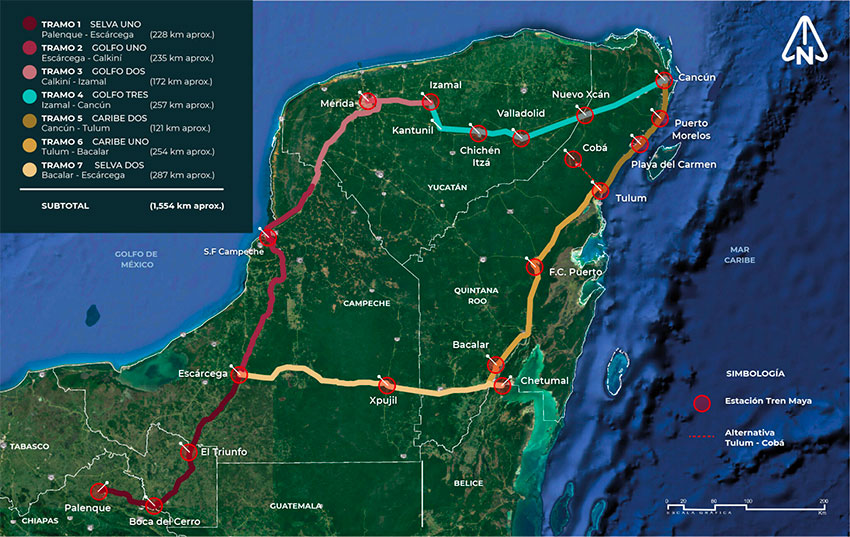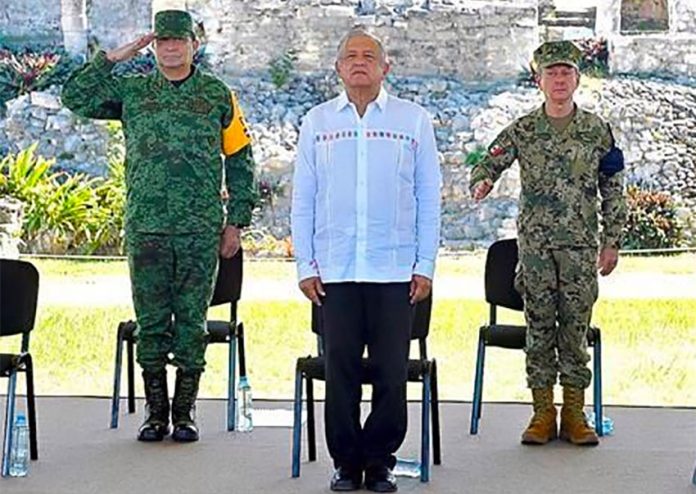President López Obrador has proposed that a state-owned company managed by the armed forces operate three sections of the Maya Train railroad and four airports, including the new one at Mexico City.
Speaking in Tulum, Quintana Roo, on Sunday, the president said the government is considering giving a military-managed state company responsibility for the Maya Train sections between Tulum and Palenque, Chiapas.
He said the government is also looking at giving the armed forces control of the Felipe Ángeles airport, currently under construction by the military at the Santa Lucía Air Force base north of Mexico City, the Tulum airport, which will be built by the army and is slated to open in 2023, and the airports in the Quintana Roo capital of Chetumal and Palenque.
The Chetumal airport is currently operated by Airports and Auxiliary Services, a federal government corporation, while the Palenque facility is operated by a company jointly owned by the federal and Chiapas governments.
López Obrador said that one objective of giving control of the Tulum-Palenque stretch of the Maya Train to a military-managed company is to ensure that the 1,500-kilometer railroad is not privatized at any point in the future.
“We have to protect this project so that there is no temptation to privatize it,” he said.
The president added that the operation of the Maya Train, which will run through Tabasco, Campeche, Yucatán, Quintana Roo and Chiapas, will fund the pensions of marines and soldiers.
López Obrador said that a second objective of the plan is to guarantee the security of the projects and the region through which the Maya Train will run.
The president has depended heavily on the military since he took office in December 2018. In addition to using the armed forces for public security tasks, he has entrusted the construction of several infrastructure projects and the control of the nation’s ports and customs offices to them.
The president’s reliance on the military has been widely criticized, especially because he pledged to gradually withdraw the army and navy from the streets. His proposal to put the armed forces in charge of the Maya Train and four airports triggered more criticism.
The newspaper Reforma, which is frequently critical of the president, said in an editorial that giving the military control of the Maya Train would be “illegal, neoliberal and even dangerous.”

It would be illegal, the newspaper said, because decisions about “the use and allocation of public resources” correspond to the lower house of Congress, not the executive power.
It would be neoliberal – López Obrador, commonly known as AMLO, says he is staunchly opposed to neoliberalism, blaming the doctrine for all manner of problems his government inherited from its predecessors – because the state-owned company proposed by AMLO “falls into the same category” as the state firm that manages the Veracruz port, of which he has been critical, Reforma said.
The newspaper said it would be dangerous because “the role and mission of the armed forces is not to do business but rather defend sovereignty.”
“It’s curious that the plan proposed by López Obrador appears to be a copy of the Military Social Welfare Institute of Nicaragua, supposedly created to guarantee the pensions of soldiers but which has ended up turning into a conglomerate of companies, opacity and corruption,” Reforma said.
“And it’s not a coincidence that [Nicaraguan President] Daniel Ortega has remained in power for 13 years by blood and fire thanks to the support of the armed forces, which [control] financial, insurance, agricultural, hardware, hotel and real estate development businesses and even supermarkets [in Nicaragua].”
Similarly, a columnist for the El Universal newspaper wrote that López Obrador’s aim in giving the military an ever-growing list of responsibilities is to “reward” it and ensure that it never opposes him or his political movement – the ruling Morena party.
“However, things could go wrong because not even the army and the navy themselves are sure they can fulfill the whims of the executive,” Mario Maldonado said in a column published Monday.
He also said that López Obrador’s heavy reliance on the military prevents private companies from participating in many large infrastructure projects. (The military is building a chain of government-owned banks in addition to sections of the Maya Train and the Santa Lucía airport, and is also responsible for distributing medications and school textbooks among other non-traditional tasks.)
“Putting the private sector to one side in the main government [infrastructure] projects is another breaking point between President López Obrador and businesspeople, who amid the Covid-19 economic debacle and the lack of stimulus from the federal government are suffering the worst crisis in recent history,” Maldonado wrote.
“In 2020, construction GDP will plummet 15%, the worst decline in the past 25 years, causing the doors of some 2,000 companies in the sector to close. That will leave at least 140,000 workers unemployed,” he said.
Maldonado noted that construction sector GDP fell 5% in 2019 despite the absence of an economic crisis, attributing the poor performance to uncertainty generated by the federal government and “the army’s meddling in infrastructure projects.”
He wrote that never before has the army had so many responsibilities or managed such large projects.

“The projects it is in charge of represent investment in excess of 500 billion pesos [US $25 billion]. But the economic power of the armed forces is a double-edged sword for AMLO: on one side, the opacity in the management of resources could cause corruption scandals for the 4T [Fourth Transformation],” Maldonado wrote, referring to the government by its self-anointed nickname.
On the other side, he continued, the pressure on the ministries of National Defense and the Navy, “which don’t have the technological resources or management capacity” to execute the projects entrusted to them, could cause an explosion “against the president.”
“Whatever happens, the interference of the armed forces in the economic projects represents a serious problem for the government with businesspeople and investors,” Maldonado said.
Before it can hand control of the Maya Train to a military-managed state company, the government first has to build the new railroad — and overcome significant opposition.
A judge in Campeche this month granted a suspension order against the 222-kilometer stretch of tracks between Escárcega, Campeche, and Calkiní in the same state. The judge ruled that construction of the section could cause irreparable damage to the environment.
Members of a collective of residents intercepted a vehicle in which López Obrador was traveling through Campeche on Saturday to deliver a letter in which they asked for section 2 of the project to run along an alternative route.
They told the president that they are not opposed to the Maya Train project per se but fear they could be evicted from their homes and land due to construction of its Escárcega-Calkiní section.
“Each of the residents have different positions but we all agree on defending our assets and the neighborhoods we’ve lived in for so many generations,” the letter said.
Several suspension orders have been granted against construction of the railroad, the government’s signature infrastructure project, but a federal court revoked one in May after it was challenged by the National Tourism Promotion Fund, which is managing the 1,500-kilometer project.
Critics, including many indigenous groups, say that the construction and operation of the railroad will harm the environment and pose a threat to people’s traditional way of life.
Source: El País (sp), Reforma (sp), El Universal (sp)
